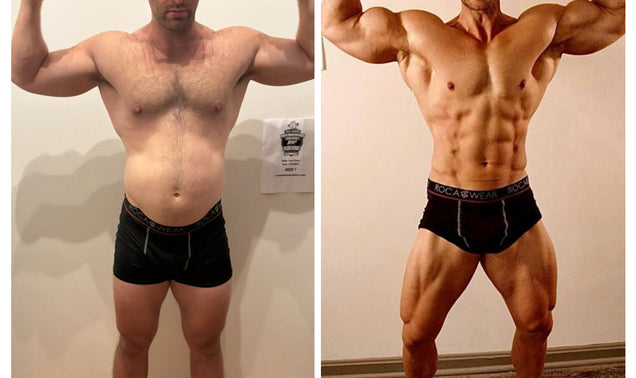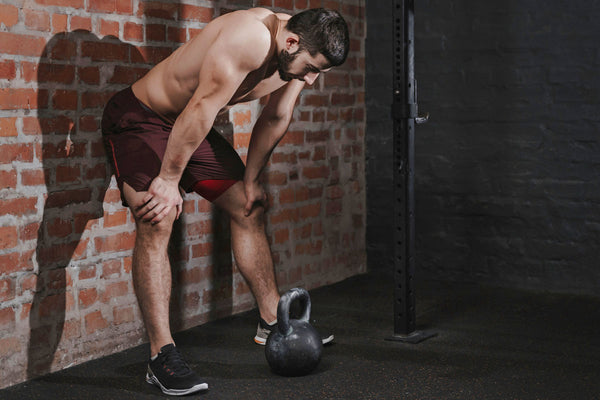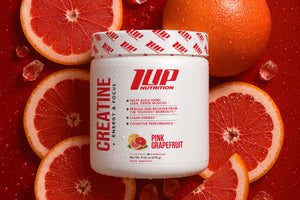To make noticeable, lifelong changes in your physique, fitness, and wellness you have to push yourself -- eating right and training hard. Modern times have programmed us to believe the “more is always better.” However, that’s not always the case -- sometimes doing more can actually be detrimental to your performance, recovery, and results. In fact, excessive exercise coupled with poor nutrition and inadequate sleep can actually lead to overtraining.
Today, we’ll highlight the signs of overtraining and tell you the best supplements to help you recover faster. Let’s start with the basics.
What is Overtraining?
Overtraining is the state where the demands from training and stresses of life exceed the body’s recovery capacity. This usually results from a combination of factors, including:
- Excessive training (a combination of too much volume, too much intensity, and too much frequency)
- Inadequate (poor quality) sleep
- Too much emotional or psychological stress (e.g. relationships, work, finances, etc.)
- Poor nutrition (e.g. too few calories, not enough protein, not enough carbohydrate, etc.)
In short bursts, such as training for a competition or prepping for a physique show, ramping up training and/or aggressively dieting may be necessary in order to achieve the desired result. However, these typically are programmed for a predetermined amount of time, usually lasting 2-6 weeks. Afterward, training intensity/volume is reduced, nutrition is modified (usually calories are increased), and active recovery measures are increased.
Signs & Symptoms of Overtraining
Overtraining is most commonly encountered in endurance athletes. In fact, research indicates that ~30% of non-elite endurance athletes and ~60% of elite endurance athletes suffer from overtraining at some point.[1,2]
While overtraining may be more frequent in professional athletes, it can happen to serious fitness enthusiasts as well as individuals participating in a transformation challenge that previously have not undertaken an aggressive diet and training program.
Here are the tell-tale signs of overtraining to look out for[3,4]:
- Decreased performance
- Increased feelings of fatigue during training (i.e. the weights feel significantly “heavier” than they usually do for several training session in a row)
- Poor appetite
- Weight loss
- Lack of motivation to train
- Prolonged muscle soreness
- Nagging injuries that never seem to completely heal
- Poor mood & feelings of well-being
- Easily agitated/irritated
- Anxious feelings
How to Prevent/Recover From Overtraining
Keep in mind that everyone displays different symptoms depending on their own physiology and what given stressors their minds and bodies are subjected to. If you suspect that you may be overtraining, take a look at your current diet, training, life stress, and sleep situation. Are you doing too much training with too little eating and poor sleep? Are you doing enough training but worried about your finances and not eating? Etc.
Everyone will have slightly different things he or she will need to address in order to promote better recovery and get the result desired from the countless hours spent training hard and eating right. With that in mind, here are a few “best practices” to keep in mind:
- Track your daily calorie and macronutrient intake (the 1UP Fitness App makes this incredibly easy. Plus we provide customized nutrition and training programs according to YOUR goals/preferences, which can help limit the occurrence of overtraining)
- Make sure to stay properly hydrated by drinking adequate fluids and consuming enough electrolytes
- Monitor your progress in the gym -- are you improving in reps completed, amount of weight lifted, etc. or are you slowly regressing in your performance?
- Monitor your heart rate during training and/or gauge how long it takes you to recover between sets. For example, if you are not lifting more weight or performing more reps, all the while requiring longer rest times then you may be overtraining/under-recovering.
In addition to the aforementioned lifestyle factors, there are certain supplements you can take to improve recovery and support your daily nutrition plan.
The Best Supplements for Recovery
Protein Powder
Consuming enough protein is critical to supporting muscle recovery and preventing overtraining. Hard workouts coupled with aggressive dieting can accelerate muscle breakdown and potentially lead to muscle and strength loss. One of the most effective ways to support muscle repair and halt protein breakdown is to consume enough protein.
Protein powder offers an easy, effective, and affordable option to help you hit your protein goals, that also tastes delicious! 1UP offers a variety of top-rated, high-quality protein powders to fit all of needs and preferences, including:
Amino Acids
Protein is made of chains of amino acids. Similar to protein, amino acid supplements can help increase the pool of building blocks (amino acids) the body needs to repair damaged tissue, synthesize hormones (including ones that affect mood and protein synthesis), and promote greater recovery. 1UP offers a pair of delicious amino acid supplements in Her BCAA/EAA and His BCAA/EAA that supply all the essential amino acids (including the 3 BCAAs) the body needs to halt muscle breakdown and fuel protein synthesis.
Creatine
Creatine stands atop the sports nutrition pyramid. It’s been used by athletes and fitness enthusiasts for decades, backed by literally hundreds of scientific studies, offers myriad benefits, and is safe. While creatine is best known as a performance and physique enhancer, improving strength and hypertrophy when used in conjunction with a structured resistance training program, it also aids hydration and muscle recovery.
1UP Pure Rebuild includes 5g of premium creatine monohydrate which offers superior mixability and absorption. Also included in every serving of Pure Rebuild are 5g L-Glutamine to aid recovery and glycogen replenishment, 2.5g betaine anhydrous to support hydration and creatine synthesis, and a full complement of essential amino acids and electrolytes. Mixing a serving of Pure Rebuild with a scoop of protein powder creates a delicious, easy-to-fix post workout meal that kick starts recovery and helps combat overtraining.
References
- Cardoos, Nathan MD. Overtraining Syndrome. Current Sports Medicine Reports 14(3):p 157-158, May/June 2015. | DOI: 10.1249/JSR.0000000000000145
- Myrick, K. M. (2015). Overtraining and Overreaching Syndrome in Athletes. The Journal for Nurse Practitioners, 11(10), 1018–1022. https://doi.org/https://doi.org/10.1016/j.nurpra.2015.08.038
- Lewis NA, Collins D, Pedlar CR, Rogers JP. Can clinicians and scientists explain and prevent unexplained underperformance syndrome in elite athletes: an interdisciplinary perspective and 2016 update. BMJ Open Sport Exerc Med. 2015 Nov 25;1(1):e000063. doi: 10.1136/bmjsem-2015-000063. PMID: 27900140; PMCID: PMC5117038.
- Kreher JB, Schwartz JB. Overtraining syndrome: a practical guide. Sports Health. 2012 Mar;4(2):128-38. doi: 10.1177/1941738111434406. PMID: 23016079; PMCID: PMC3435910.






